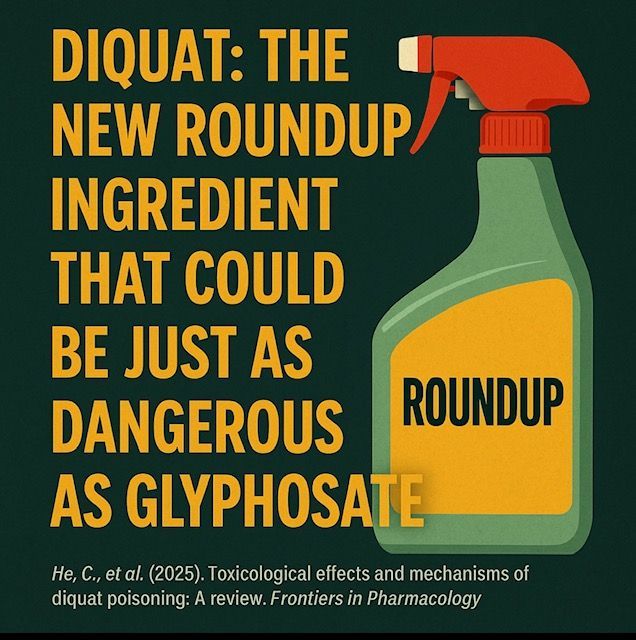Diquat: The New Roundup Ingredient That Could Be Just as Dangerous as Glyphosate
As glyphosate fades from the spotlight, Roundup’s new ingredient diquat may pose even greater health risks affecting the gut, liver, kidneys, and nervous system.
Diquat: The New Roundup Ingredient That Could Be Just as Dangerous as Glyphosate
As glyphosate faces mounting scrutiny, Roundup’s quiet ingredient swap raises new red flags.
For years, glyphosate has dominated headlines as a known toxin found in Roundup, the world’s most widely used weedkiller. Studies have linked glyphosate to everything from cancer to hormone disruption, leading to a wave of lawsuits and growing public concern. In response, Roundup’s manufacturers have now begun replacing glyphosate with a different chemical: diquat.
But is this really a safer choice?
According to new research from Suining Central Hospital in China, diquat may be just as dangerous—if not worse. Published in Frontiers in Pharmacology (2025), the review outlines how diquat can cause severe, sometimes fatal, damage to the gut, kidneys, liver, and nervous system.
What Is Diquat and Why Should We Be Concerned?
Diquat is a fast-acting herbicide that belongs to the same chemical family as paraquat, a notorious toxin banned in over 70 countries due to its lethal effects on humans. Although diquat is legal in the U.S., it was banned in the European Union in 2018 over concerns about health risks for both agricultural workers and nearby residents.
What makes diquat particularly alarming is its mechanism of action. The chemical accumulates in the body after ingestion or exposure and can quickly lead to acute poisoning and organ failure. And unlike glyphosate, which primarily affects the endocrine system, diquat’s impact is even more direct—targeting essential organs with rapid toxicity.
The Gut: First Hit, Worst Hit
One of the most shocking findings from the study is the way diquat damages the gut. The researchers found that the intestinal lining is one of the first points of contact and also one of the most severely affected. This matters deeply because your gut is your body’s first defense, your immune stronghold, and a key player in everything from mood to metabolism.
Chronic gut damage can trigger a domino effect of health issues—autoimmunity, fatigue, food sensitivities, brain fog, and more. And sadly, the people most at risk are often those with the least access to protective equipment: farmworkers, rural families, and populations in countries like Brazil where use is rising.
From One Toxin to Another: The Illusion of Progress
This shift from glyphosate to diquat isn’t progress—it’s a chemical sleight of hand. Swapping one harmful substance for another doesn’t protect people. It just rebrands the problem.
While regulators and manufacturers may spin this as a safety upgrade, the data tells a different story. Diquat is not a harmless alternative. It’s a deeply toxic compound, and widespread exposure without full transparency or public awareness is a recipe for long-term harm.
Where Do We Go From Here?
If you’re frustrated, you’re not alone. Many of us grew up trusting that what’s on the shelves has been thoroughly vetted and proven safe. But this isn’t always the case—especially when it comes to agricultural chemicals.
The good news? You have options. Choosing organic produce, filtering your water, reducing pesticide exposure, and working with a practitioner who understands root-cause healing can help protect your body and your family.
You deserve clear answers. You deserve a practitioner who listens, looks deeper, and helps you take back control of your health.
Ready to take the first step?
I offer a free 15-minute call to explore your symptoms and see if my root-cause approach is a fit for you.
Visit www.ExecutiveFunctionalHealing.com to book your spot.
Study Reference:
He, C., et al. (2025). Toxicological effects and mechanisms of diquat poisoning: A review. Frontiers in Pharmacology.

